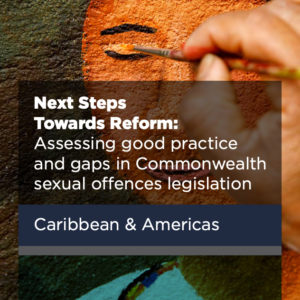Trinidad and Tobago’s sexual offences laws are set out in the Sexual Offences Act [Chapter 11.28] (SOA) (as amended by the Sexual Offences (Amendment) Act 2000) and the Children Act 2012 (CA).
The 2012 Act introduced major changes to the law on sexual offences against children. It provides a framework for offences against children, including sexual assault. It has a number of positive features, including criminalising a range of sexual offences against children and providing close-in-age defences to prevent criminalising consensual sexual activity between young people. Importantly, this defence is explicitly excluded if there is a breach of trust or coercive situations. However, the provisions are discriminatory as they do not cover consensual same-sex activity between young people and their peers.
The SOA needs to be modernised to explicitly include as crimes all sexual acts when non-consensual. Currently, the Act does not expressly cover all acts of sexual touching, unlike the CA. The SOA also criminalises consensual sexual intercourse with a woman with intellectual or cognitive disability and uses the offensive and derogatory term, ‘mentally subnormal’ to describe such a person.
The SOA and the CA are not aligned in some important respects. For example, although penalties are not assessed in this report, it is noted that the CA imposes more serious penalties than the SA for comparable offences, such as touching and other non-penetrative acts. These offences carry sentences of 10-20 years or life imprisonment under the Children Act, whereas they carry 5 years under the SOA. Also, the age of consent differs. It is 18 under the Children Act and 16 under the SOA.
In 2018, the High Court held that criminalising same-sex sexual activity is unconstitutional (Jason Jones v Attorney General). The Government has appealed this decision. Laws that criminalise consensual same-sex sexual activity, such as ‘buggery’ and ‘sodomy’, should be repealed and all non-consensual sexual acts, including anal ‘rape’, should be included in the standard sexual assaults provisions, such as ‘rape’ and ‘sexual assault’. All of these crimes should be gender-neutral. The Government should decriminalise all consensual same-sex sexual activity, including extending the close-in-age defences in section 20 of the CA to consensual same-sex activity among young people who are peers.
Trinidad and Tobago is a state party to relevant international and regional human rights treaties, including the Inter-American Convention on the Prevention, Punishment, and Eradication of Violence against Women (Convention of Belém do Pará), UN Convention on the Elimination of All Forms of Discrimination against Women, Convention on the Rights of the Child, Convention on the Rights of Persons with Disabilities, Convention against Torture and Cruel, Inhuman and Degrading Treatment or Punishment and International Covenant on Civil and Political Rights.
The full assessment of Trinidad and Tobago is available here.



